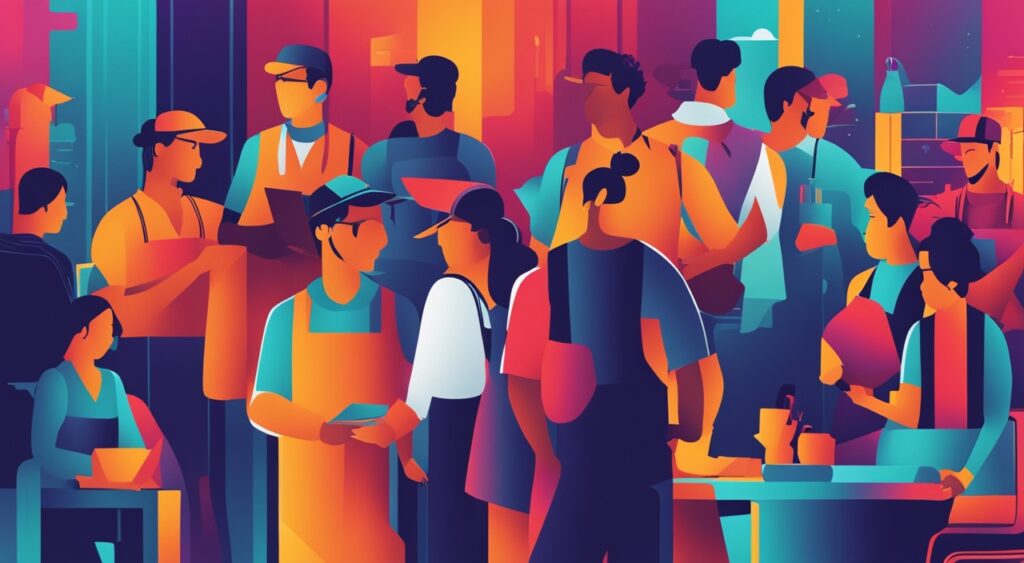The gig economy has changed the way we work. Now, 1.57 billion people, or 46.4% of the world’s workers, are freelancers. They use online platforms to offer their skills and get paid for their work.
Gig workers, or freelancers, do tasks for different clients or platforms. They don’t work for just one company like before. This shift has changed the job market a lot.

Key Takeaways
- The gig economy has led to a rise in independent contractors, with a 27% increase since 2003.
- Gig jobs in industries like coding and design require specialized skills, leading to increased demand for training and education.
- Digital platforms have disrupted traditional industries and created new opportunities for entrepreneurs and small business owners.
- The gig economy has contributed to a decline in traditional jobs and a shift towards a more flexible, project-based labor market.
- Gig workers often lack the benefits and job security of traditional employment, leading to financial uncertainty.
The Rise of the Gig Economy
The gig economy has changed how we work. It’s all about flexibility and working on demand. Thanks to new tech, changes in people, and wanting to start businesses, this market has grown a lot.
Definition and Scope
The gig economy is all about freelance work, on-demand jobs, and temporary assignments. People work as independent contractors instead of regular employees. This way, they can choose their work and have flexible employment. They can also do side hustles and project-based jobs, fitting their work to their life.
Growth and Drivers
The gig economy is getting bigger, with 36% of workers, or 58 million people, now freelancing. This is a 10% jump from 2016. What’s pushing this change?
- Technology makes it easy to work together and find different kinds of workers.
- More Millennials want jobs that let them work on their own time.
- The gig economy lets people use their skills and interests to earn money.
- It’s cheaper for companies to hire specialized talent without long-term jobs.
More digital platforms and the need for on-demand services are helping the gig economy grow. This is true in many areas, like transport, hotels, creative work, and IT.

| Sector | Gig Worker Contribution |
|---|---|
| Transportation | 40% of the global workforce |
| Healthcare | 15% growth rate per year |
| Creative Industry (UK) | £109 billion annually |
The gig economy is still changing. It brings both good and bad for workers and companies. It’s changing the future of work.
Impact on Workers
The gig economy has changed how workers live and work. It offers both good and bad sides. Workers like the freedom it gives them. They can pick when and where they work.
This means they can balance work and life better. It’s great for parents, students, and retirees. They can choose from many side hustles or project-based jobs.
But, this freedom has its limits. It’s harder for those with little power or experience. Freelance work and temporary assignments are not steady. This makes it hard to know when you’ll get paid or how long jobs will last.
This can cause money problems and job insecurity. It’s tough for those without a safety net.
Still, the gig economy can help workers grow. Independent contractors get to work on different projects. This lets them learn new skills and grow professionally.
| Advantages of Gig Work | Challenges of Gig Work |
|---|---|
| Flexibility and autonomy Ability to pursue multiple income streams Opportunities for skills development | Instability and unpredictable income Lack of job security and benefits Difficulty in forecasting earnings |
gig economy: Impact on Businesses
The rise of the gig economy has changed how businesses work. It brings both good and bad sides. One big plus is that companies can easily scale their workforce up or down. This is done without the cost of keeping a full-time staff.
Starting new workers can cost over $40,000 for small to medium businesses. But, this cost drops almost to zero with gig workers. Also, companies can find specialized talent for specific projects. This is a smart way to meet changing market needs without always training the same people.
Scalability and Cost Savings
The gig economy lets companies grow or shrink their teams as needed. This means big savings, as starting new employees can cost more than $40,000. It’s a smart way to cut costs.
Access to Specialized Talent
Companies can find skilled workers for short-term projects. This helps them meet new market needs without always training their staff. It’s a flexible way to work in the gig economy.
But, keeping teams together, making sure work quality is good, and talking to remote workers can be hard. These are challenges for businesses in the gig economy.

Societal Implications
The gig economy is changing work and society in big ways. It’s making people use their time differently. Now, they can use Uber to get around and save time for work or side jobs. Food delivery services also save time by making meals easy to get.
Changing Consumption Patterns
The sharing economy and more freelancers are changing lives for many. People can now easily get others to do tasks like driving, cooking, and cleaning. This gives them more time for their jobs and side work. It’s changing how we use goods and services and our society’s structure.
Social Security and Benefits
But, there’s a big worry about social security for gig workers. They might not have the usual benefits. This means they could struggle with retirement savings and healthcare. It’s a big risk for those in project-based jobs and the freelance world.
| Statistic | Value |
|---|---|
| Annual revenue of digital outsourcing platforms in the gig economy (2016) | $4.8 billion |
| Estimated annual revenue of digital outsourcing platforms in the gig economy (by 2020) | $15-$25 billion |
The gig economy is getting bigger, and we need to tackle its challenges. We must work together to make sure it’s fair and protects everyone’s rights. We need to help those in side jobs and the freelance world stay safe and secure.
Conclusion
The gig economy has changed the way we work. It offers both good and bad things. In India, it gives workers freedom and new chances. But, it also brings worries about job security and fair pay.
As the gig economy grows, we need to work together. This means policymakers, businesses, and workers must find a way to grow safely. They should focus on keeping the gig workers safe and happy.
Many things have made the gig economy grow. These include new ways of thinking about work and new business ideas. Also, big companies want more contract workers. But, gig work can be unstable and doesn’t always offer the same benefits as regular jobs.
This has led to calls for more rules and protection for workers. Employers need to adapt to the gig economy. They should use technology to manage workers well and create good workplaces for gig workers.
By finding a balance between business needs and worker happiness, we can make the most of the gig economy. This will help create a future of work that is more dynamic and includes everyone.
FAQ
What is the gig economy?
The gig economy is when people use online platforms to offer their skills and time. They work on projects for different clients instead of having a single job. This way, they earn money by doing various tasks.
How has the gig economy grown in recent years?
Now, 1.57 billion people, or 46.4% of the world’s workers, are freelancers. This shift has changed many industries. A survey found 36% of workers, or 58 million, are now independent, up from 2016.
What are the key benefits of the gig economy for workers?
Gig workers enjoy more freedom and flexibility. They pick their projects and work hours. This is great for parents, students, retirees, and anyone wanting a better work-life balance.
What are the challenges faced by gig workers?
Gig workers face unstable income and job security. They don’t get social security benefits. This means they must save for retirement on their own, which is hard for many.
How does the gig economy benefit businesses?
Companies can easily adjust their workforce as needed with gig workers. They save on costs and can hire experts for short-term projects. This helps them stay flexible in a changing market.
How is the gig economy impacting societal trends?
The gig economy is changing how we work and live. It’s affecting many parts of society. People are now using services like fast transport and food delivery to make their lives easier.














